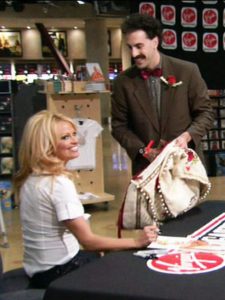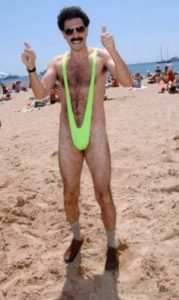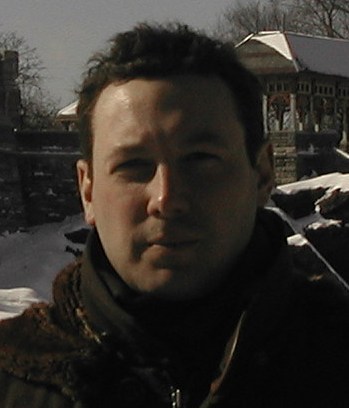A room full of jaded hacks from all corners of the globe isn’t exactly a comedian’s dream audience. Add to this the fact that the press conference is actually scripted, all questions having been submitted in advance, making the assembled journos little more than unpaid background artistes for the filming of a DVD extra. Worse still, they’ve been kept waiting in a hot room in London’s Dorchester Hotel for over an hour with no food except for biscuits and no booze; there are only so many cups of coffee one can drink. And yet, when finally Borat – AKA actor and comedian Sacha Baron Cohen –deigns to appear, he has people falling off their chairs laughing.
“You are Scottish, like Braveheart?
Like anti-Jew warrior Melvin Gibson.”
Preceded on stage by Azamat Bagatov (played by Californian-born character actor Ken Davitian), Borat’s overweight producer whose eyebrows are, alarmingly, even bigger today than in the film, Borat bounds into the room, glad-handing those sitting on the aisle and, in the case of one lucky man, giving out an enthusiastic kiss.
 “Jagshemash!” he booms from behind a podium, in front of which stand auto-cue screens; so much for Baron Cohen the master improviser. Much of his resolutely un-PC material has been heard before at other press conferences available online, as have some of his put-downs to members of the press asking questions.
“Jagshemash!” he booms from behind a podium, in front of which stand auto-cue screens; so much for Baron Cohen the master improviser. Much of his resolutely un-PC material has been heard before at other press conferences available online, as have some of his put-downs to members of the press asking questions.
“Hello, little boy,” he addresses a diminutive woman with short hair, or, on hearing a Scottish accent, he remarks, “You are Scottish, like Braveheart? Like anti-Jew warrior Melvin Gibson.”
To a room full of people for whom this is a job of work, it does feel slightly pointless, especially when he keeps to Borat’s persona by refusing to answer questions from a woman. The journo in question, wearily and reluctantly, plays along with the pantomime of getting a male colleague to pass on the message. Even so, there’s no doubting that, recycled though his material is, it’s hilarious.
“Very popular in Kazakhstan is singing transvestite Madonna. He really looks like a womans! Only thing that give him away is his huge hands.”
Or, when asked if he’d consider going out with a British girl, he answers that he’s particular keen to make the acquaintance of “Welsh prostitute, Charlotte Church”.
It’s a surreal day, that’s for sure, but not one that does justice to Borat’s movie – a semi-improvised road-trip that sees Borat’s racism, anti-Semiticism, ignorance and misogyny used as a tool to hold a mirror up to modern America’s prejudices. In a hotel room in London, it’s amusing and risqué, but that’s not the whole Borat story.
Borat started out life as a minor character on Channel 4’s Da Ali G Show, Baron Cohen’s chatshow format for his wannabe gangsta persona, Ali G. When the show was picked up by HBO in the US, Baron Cohen suddenly started swimming with the big fish in Hollywood’s comedy pond. It was director/producer Jay Roach (Meet The Parents, the Austin Powers movies) who first saw the potential of giving Borat his own film.
“We saw an opportunity to do a film that was bold, subversive and fresh,” he tells The Big Issue. “We wanted to transplant the reality TV show, which has Sacha in character, interacting with real people. Then, we created a story that supports a feature film.”
Writers Peter Baynham (I’m Alan Partridge), Anthony Hines (Dennis Pennis, Da Ali G Show) and Dan Mazer (also executive producer) were recruited to provide a basic storyline. But there was no script – the movie was an audacious experiment to bring a fictional character crashing into our world. Real events with real people push the film’s fictional story, and when scenes played out in unexpected ways, the team had to rewrite the outline. As director, Roach brought in Larry Charles, a man best known for Seinfeld and its wholly improvised spin-off, Curb Your Enthusiasm. The result is possibly the funniest, darkest, most compellingly subversive film ever made.
“I think what Sacha does in this film is revolutionary,” agrees Roach. “He’s created a totally believable, hilarious, fish-out-of-water character. Then Sacha takes Borat into often dangerous predicaments with real people who have to believe that Borat is authentic the entire time – or else Sacha could face serious consequences.”
 As it was, the production’s guerrilla-style filmmaking involved the cops on numerous occasions. A warrant was issued for Baron Cohen’s arrest in New York, after he – as Borat – ran naked through a hotel waving a rubber fist-shaped dildo. While he narrowly avoided incarceration, producer Monica Levinson and production manager Dale Stern didn’t fare so well, thrown in a cell by the NYPD for ‘borrowing’ a phone, alarm clock and comforter from a local hotel to use as props. Even though the filmmakers had a location agreement and a $5 million insurance policy, the police went ahead with the arrests. To protect his colleagues, Stern ate a sheet listing the names and phone numbers of the film’s crew.
As it was, the production’s guerrilla-style filmmaking involved the cops on numerous occasions. A warrant was issued for Baron Cohen’s arrest in New York, after he – as Borat – ran naked through a hotel waving a rubber fist-shaped dildo. While he narrowly avoided incarceration, producer Monica Levinson and production manager Dale Stern didn’t fare so well, thrown in a cell by the NYPD for ‘borrowing’ a phone, alarm clock and comforter from a local hotel to use as props. Even though the filmmakers had a location agreement and a $5 million insurance policy, the police went ahead with the arrests. To protect his colleagues, Stern ate a sheet listing the names and phone numbers of the film’s crew.
“Monica and Dale’s night in jail raised the bar for a filmmaker sacrificing for his or her art,” says Roach admiringly.
 Baron Cohen no doubt has similar stories, especially as he reportedly r#main#d as Borat even when being beaten to the ground by security guards. But his insistence on staying in character and refusal to appear before the press as himself, while no doubt th# k#y to his fantastic performance, is intensely frustrating. Back in the Dorchester, the final question comes from a man who tells Borat that he’s from Israel.
Baron Cohen no doubt has similar stories, especially as he reportedly r#main#d as Borat even when being beaten to the ground by security guards. But his insistence on staying in character and refusal to appear before the press as himself, while no doubt th# k#y to his fantastic performance, is intensely frustrating. Back in the Dorchester, the final question comes from a man who tells Borat that he’s from Israel.
“What?!” rails Borat, horrified. “Do not attack! I see your claws!”
Even though everyone in the room is in on the joke and knows that Baron Cohen is himself Jewish, a palpable sense of unease still comes to the room. And then it hits: we’re in a room watching a man who, unapologetically, is coming out with anti-Semitic bile that Hitler or Bin Laden might baulk at. And – this is Baron Cohen’s genius – we’re all laughing our asses off.


